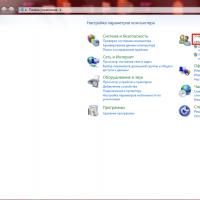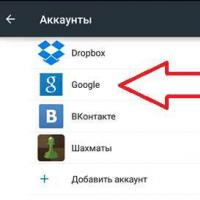How did Facebook come about? History of creation. Stories on Facebook are no longer a novelty! History of the creation of facebook in english
An obvious fact: it takes a lot of insolence to be successful in life. The Facebook success story once again fully confirms this thesis, since initially Mark Zuckerberg, without demand, borrowed data and photographs of his fellow students and published them on the network.
A short history of Facebook
Mark Zuckerberg in October 2008So it all started in 2003 when a Harvard student Mark Zuckerberg hacked into the database of his student dormitory, after which he posted personal information and photographs on the network. He published all this stuff in the Facemash program he created. The goal was to entertain users who needed to rate the photo and decide which one was “Wow!” And which was “Hot or Not”.
The result caused more outrage than laughter, because none of the victims of such a "beauty contest" Zuckerberg did not ask permission. The university administration was also not happy, and the site was removed from the network.
However, Zuckerberg already felt the promise of this idea and began further development of the project. In early 2004, Mark launches TheFacebook, which immediately causes a scandal again: three of his fellow students, a few days after TheFacebook went online, said that Zuckerberg had stolen the idea from them. But the social network that began its path to success was unstoppable.
In just a few weeks, dozens of Harvard students signed up to TheFacebook. The news of the emergence of a new social network spread very quickly, and soon students from other universities - Yale, Columbia and Stanford - were captured by a wave of enthusiasm.
Zuckerberg brought in several fellow students into his business and soon moved from his student dormitory to Harvard. In the summer of 2004, the first office was opened in Palo Alto, and soon the first investor appeared. Former CEO of PayPal Peter Thiel supported a start-up company by investing about 450 thousand euros in it.
 Former PayPal CEO Peter Thiel supports start-up company
Former PayPal CEO Peter Thiel supports start-up company In 2006, the launch of the Facebook news feed set the stage for its ultimate breakthrough, and just four years later, the social network has over a billion page views every month.
Just nine years after its inception in a student dormitory at Harvard, Facebook was worth about $ 5 billion (as of May 2012). Today, the resource is worth more than 300 billion euros and provides jobs for about 30 thousand employees around the world.
Photo: pxhere.com, wikimedia.com
The Hollywood film is about a Harvard student who needed a service to find and meet girls.
This version is as far from the truth as possible, Mark Zuckerberg told Matthias Dopfner in an interview with Die Welt am Sonntag.
At that time, Mark already had a girlfriend - Priscilla Chan, his current wife, and he himself was obsessed with the Internet. Google was a great tool for finding news, Wikipedia made it easy to find the background information you were looking for, but it wasn't enough.
“There was no service that would let you know anything about other people. I didn’t know how to create such a service, so I started working on others, less versatile, ”Zuckerberg told Dopfneru.
He wrote a little app called Coursematch where people could mark which courses they were taking at the university. He also created Facematch, as shown in the movie The Social Network. But as Zuckerberg says, it was just a joke.

Instead, Facebook came about because one student spent too much time coding and very little time in class. This is the story of how Zuckerberg turned a study service into a social network. And why hasn't anyone done it before him?
But how did you become Facebook?
Mark Zuckerberg: In the end, it all happened thanks to a subject called "Rome of Augustus", it was a course in art history. There were different works of art in the class, you were shown several of them, and you had to write an essay on the historical significance of these works.

I did not pay enough attention to my studies, because at that time I was programming, and therefore, when it was time for the final exam, I realized that I was finished, because I knew absolutely nothing about the subject.
So I wrote a curriculum that randomly showed you one of the works of art, and you had to specify what exactly it was important from the point of view of history. I sent this program to general email and wrote, "Hey, I made a curriculum here," and everyone started using it. And the program itself has become an excellent social way of learning.

In total, during my studies at Harvard, I did about ten such programs. I thought it would be nice to combine their functions in one application through which people could share anything with others. This is how the first version of Facebook was born.
How long did it take to develop?
It took only a couple of weeks to create the first version of Facebook, as I already had a lot of things ready.

When did you feel like your idea could be something bigger?
I remember pretty well the night I started Facebook at Harvard. We used to go to eat pizza with a friend with whom we did computer science assignments.
And I remember saying back then that I was glad that we had a network at Harvard through which it was possible to communicate, and that someday someone would make the same network around the world.
Then I didn't even think that it could be us. Nobody said, "I hope we can turn this into something big." I had no idea that it would be our doing. We were just students. When I look back over the past 12 years, what surprises me most is that no one has done this before. And I ask myself why it happened.
And really why?
It seems to me that there were always reasons not to do this. At every stage, people said to themselves, "This is only for young people," and no one worked on this idea as much as they could. Or, "Okay, some people are using this service, but it won't make money." Or "Yes, it seems to work in the US, but it won't work all over the world." Or "Oh, it works, but it's unlikely to be on mobile." These are all excuses, as you probably know.
And you just took it and did it
Yes. This was just the beginning of Facebook. Now, after 12 years of history, the company is investing in technologies of the future, from artificial intelligence to virtual reality.
Probably, you already know what Facebook is and there is no need to describe known things to everyone? Therefore, I want to tell you the story of Facebook in my free presentation. More precisely, the history of the creation of Facebook and its development to the level of the largest social network in the world.
Yes, perhaps this is the most powerful social network in the world, which over the years has evolved from a service for a small circle of friends into a global platform for communication. This word is now on the lips of every representative of the progressive young generation. Facebook is gradually becoming an integral part of our life. And it is no coincidence.
The history of the creation of Facebook began long before the final formulation of the very concept of "social network". At the time of the birth of Facebook, there were no social networks in our usual sense. The history of the development of Facebook is at the same time the history of the development of social networks.
Everything new that appears on Facebook is copied by others and becomes the de facto standard. And that's why the Facebook story gets so much attention. She uses her example to study the experience of building a perfect new service, the experience of developing and implementing social services, and the experience of interacting with huge masses of users.
Now let's take a closer look at the history of the creation of Facebook in a little more detail and in more detail. In order to taste the experience too :)
Mark Zuckerberg
The founder and "developer" of Facebook is Mark Zuckerberg - a young man who dropped out at Harvard (just because of Facebook), with a non-standard view of how people communicate with each other.
The personality is rather controversial. Someone considers Zuckerberg to be a disinterested genius who has made all mankind happy. Someone is an unprincipled thief who thinks only about getting a lot of money. Someone is just a lucky person who created a service that is called "for himself", which then "shot". There are many opinions.
Personally, I consider Zuckerberger a typical Jew who clearly sees his goal and goes to it, regardless of anyone and not stopping at anything. All history of Facebook development this confirms. What is the purpose? Wait and see.
Start
The youngest billionaire of our time, Mark Zuckerberg, developed a passion for computers in the 6th grade. He began his thorny path with the well-known programming language C ++ and in his early years developed the computer "Risk". Then there was the program that Zuckerberg created for his father. With the help of it, employees of his company could communicate with each other.
After that, Mark programmed a special application called "Synapse", capable of automatically generating "playlists" of listeners based on their musical preferences. The program was so successful that monsters like Microsoft and AOL turned their sophisticated eyes on it. The company immediately offered Mark a good job (albeit on condition that all rights to "Synapse" go to Microsoft). Already a sensible young man in his early years, Mark Zuckerberg refused.
He wanted more. And now we can say that then he did the right thing. By the way, the relationship between Mark Zuckerberg and Bill Gates does not end there, but more on that later.
Why Facebook is "Facebook"
Many believe that it begins with the days of Harvard University, where Mark entered the faculty. A talented programmer with great potential at the Faculty of Psychology - it was a rather non-standard decision :-)
However, the story of Facebook's creation began a little earlier - at the Phillips Exeter Academy, a private school with a rich tradition in New Hampshire. Rather, not the creation itself, but the accumulation of the basis on which Facebook subsequently grew.
As a student of this school, Mark Zuckerberg received the so-called "The Photo Address Book" at his disposal. It was a kind of student directory, in which one could get acquainted with photographs, phone numbers and even the addresses of their classmates. The data in it was updated annually, so it was very convenient for every student.
Do you know what the schoolchildren called this book among themselves? "The Facebook"! The reason for the banality is simple - the original name was too long to pronounce.
When he entered Harvard, Mark discovered that there was no such service at the university. He took the initiative to create an online directory like "The Facebook" in front of management. And he was refused, which was based on the confidentiality of student data.
In narrow circles, they say that this circumstance really pissed off the talented programmer. And he was not going to back down.
Facemash
One fine day (or night) Mark Zuckerberg hacked into a Harvard University database and created a simple site, code-named "Facemash". The concept of this site was simple - the visitors were offered photographs of female students and the possibility of assessing them according to a certain "scale" of attractiveness. The site was only accessible inside Harvard.
What came out of this, it is better to indicate in numbers and figures: 2 hours after the launch of the site - 450 visitors and 22,000 views of photos! Note that the attendees were fellow students at Harvard University. Those. 450 direct acquaintances of the owners of the posted photos in 2 hours!
As soon as information about such a "heroic" act reached the management of the educational institution, it was not Mark Zuckerberg who was enraged. As a result, he got serious problems, and the site was safely closed. But if someone thought that this stopped Mark, then he is deeply mistaken.
Facebook creation
February 4, 2004 can be remembered for various events. For example, on this day at the Sotheby’s auction, the most inveterate collectors fought for the right to own the stunning sculpture “The Great Dancer” by Edgar Degas. And on the same day, the social network "The Facebook" was launched in a small room of the Harvard University dormitory. Launched quietly, modestly and without fanfare.
In addition to Zuckerberger, the "starting" lineup included three more students: Eduardo Saverin (as the first Facebook financier), Dustin Moskowitz and Chris Hughes (as assistant programmers).
This is how it began modern history of Facebook... The initial promotion and formation of the starting audience was carried out using the good old SPAM. This is one of the most striking examples of when SPAM gave phenomenal results.
Winklevoss brothers, take one
A huge number of scandals always gather around any brilliant idea. And the history of the creation of Facebook was no exception.
Exactly 6 days after the launch of Facebook, three Harvard undergraduates (Brothers Cameron and Tyler Winklevoss, as well as their friend Divya Narendra) accused Mark Zuckerberg of stealing their idea, on the basis of which, according to them, he created Facebook.
They claimed to have hired Mark Zuckerberg back in 2003 (inspired by the "success" of his Facemash story) to create their HarvardConnection.com service. They convinced everyone and everything that a number of their personal ideas and developments, which they shared with Mark, were impudently borrowed by the latter when creating Facebook.
The details of this scandal are not particularly interesting, and the information about it is very contradictory. Let's dwell on the main points and that will be enough.
The offended high school students complained to university officials and persuaded the university's Harvard Crimson newspaper to publish a revealing article. This was facilitated by the appeal of another student, John Thomson, who claimed that Zuckerberg on Facebook used his idea as well.
The history of litigation and mutual claims lasted for several years. As a result, Facebook paid $ 65 million in compensation: $ 20 million in cash and $ 45 million in Facebook shares.
My opinion coincides with the opinion of other reasonable people who believe that Zuckerberg stole, if not completely, then a significant part of the idea from the Winklevoss brothers. And since they did not enter into any contracts with Zuckerberger when hiring them, the history of the creation of Facebook is associated with the name of Mark Zuckerberger, and not the Winklevoss brothers.
History of Facebook development
Initially, "The Facebook" focused exclusively on Harvard University. In the first month of the existence of the social network, about half of Harvard's students signed up to it.
But already in March 2004, "The Facebook" went beyond the walls of Harvard and connected students from Stanford, Columbia University and even Yale to its network. Mark Zuckerberg targeted the universities of the so-called "Ivy League", which included all the elite educational institutions. Then most of the largest educational institutions in the United States and Canada were gradually connected to Facebook.
Any development is impossible without active investments. At the time of its creation, "The Facebook" existed on the bare enthusiasm of fellow students and the small financial investments of Eduardo Saverin (whom Zuckerberg would later cunningly "throw" out of the company and leave with his nose) to pay for server services.
But the hour came when Facebook got so big that it demanded maximum attention. And in order for the history of its development not to be interrupted, more significant finances were required. Mark Zuckerberg leaves for Silicon Valley and settles in Palo Alto. There he met Sean Parker, who went down in the history of the Internet, thanks to the creation of the file-sharing network Napster, which was sensationalized by numerous scandals and lawsuits with record companies. After the closure of Napster, Parker dreamed of working for a company that would revolutionize the world with its ideas.
Facebook met this Parker's “requirement”. And Parker was needed by Zuckerberger because of his many acquaintances with the financial tycoons of Silicon Valley. As a result, at some point in Facebook history, Parker and Zuckerberg worked together to develop the company.
Sean Parker convinced Zuckerberg of the need to grow the project and attract third-party funding, which he promised solid support.
The first investor in Facebook was Peter Teale, one of the founders of the famous PayPal. His investments amounted to $ 500 thousand. Thanks to this, in less than six months, "The Facebook" has collected the first million users. Since that moment in its history, the company has been actively engaged in venture investment issues.
In 2005, for just $ 200,000, there was a slight change in the social networking domain name. The prefix "the" disappeared and just "Facebook" appeared. After that, the social network ceased to be positioned as focused exclusively on students. Anyone could register to communicate with their friends. A new stage has begun in the history of Facebook.
Facebook and the world
For example, the monopoly Yahoo! offered 900 million dollars for the entire project. And he received another refusal from Zuckerberg.
This is where Bill Gates reappears in Facebook history, buying a 1.6% stake in Facebook for $ 260 million. From that moment on, the founder and mastermind of Microsoft corporation started his personal page on the social network. But if you think that Mr. Gates limited himself to this, then you are deeply mistaken.
After buying the shares, he entered into an agreement with Facebook, under which the social network posted Microsoft on its pages until 2011.
In 2008, Mark Zuckerberg became the youngest billionaire in world history - his fortune was estimated at $ 1.5 billion.
Russian investors can also be found among Facebook's shareholders. In 2009, Digital Sky Technologies, which is controlled by Yuri Milner, Grigory Finger and Alisher Usmanov, acquired 1.96% of preferred shares for $ 200 million. Later, Russian investors bought another 3% stake. Today the participation of "Digital Sky Technologies" is 10%.
The social network Facebook is actively developing and implements its own API that allows you to connect numerous applications (games, informers, calendars, etc.). And on September 30, 2010, Facebook entered into an agreement with the telecommunications corporation Skype, so the integration of the two giants is expected in the near future.
Facebook representatives say that in 2011, the billionth user will register on the social network. And colossal efforts are being made to reach this mark.
Today, Facebook can be viewed in 68 languages. Promotion to many regions of our planet is complicated by low-speed Internet. And serious steps are being taken in this direction - the creation of a light version of the social network called "Facebook Zero". Negotiations are also underway with representatives of mobile communication companies (including Beeline and MTS) about the possibility of viewing pages from mobile phones.
In the current 2011, the Facebook story promises to be no less interesting. Just what is the next lawsuit of the Winklevoss brothers, who again decided to "shake" the wallets of the founders of the social network. This time, the brothers' financial appetite increased substantially. No specific amounts have been disclosed, but according to some sources, claims of $ 500 million and more can be expected.
Perhaps the voracious millionaire siblings should focus on making their biggest dream come true of being on the Olympic rowing team at the 2012 Games? In any case, now the whole world is waiting for the end of another bold attempt of the brothers.
Conclusion
History of Facebook vividly confirms one simple thought - everything is only in your hands. You can, of course, look for a guy who will do everything, and all you have to do is get a profit. Only in this case there is a very great chance to fly, like the Winklevoss brothers.
And you can not wait for the weather by the sea and implement YOUR ideas with YOUR OWN hands. Let it be clumsy, let it learn in the process from your mistakes, but in this case you definitely will not have to regret that someone was faster than you. After all, it is much more profitable to get the necessary knowledge than to miss the "right of the first night" :-)
As for the development of Facebook, then I think the idea itself has reached its peak. Further growth is possible only purely quantitatively. And then only for a while. And then something new is bound to appear on the Internet and Facebook will become "one of".
If you are interested in the Facebook story and you “have no strength to hold on anymore”, then I advise you to read the book « » ... It describes the creation of Facebook in more detail in a type of art form. True, they try to make Zuckerberger white and fluffy, but this is the only drawback of this book.
"All in your hands!"
It is under this motto that I would like to start a story about the largest social network - Facebook. Like any well-known Internet project, Facebook has more than an entertaining history of founding and further development, which eventually led the network to worldwide popularity and to a billion user pages!
How did Facebook start?
The date of creation of the Internet project is considered February 4, 2004, and the initial goal was much narrower than the current situation. We can say with confidence that Facebook was born in his student years, the permanent project leader, Mark Zuckerberg (according to Forbes, the youngest billionaire in the world!). Mark's first steps are taken in a hostel at Harvard University, and he cannot do without disagreements between the leadership of the educational institution. And in the future, there will be lawsuits from the former partners in the previous project ...

Until September 2005, Facebook existed only as a student service, which for almost a year and a half unites all major universities in the US and Canada. The turning point was June 2006, when the project became open to professional communities. And by September of the same year, free registration becomes available ...
The social network Facebook has been and is a large platform for developers from all over the world, having opened to third-party developers in May 2007, it has about 400 thousand programmers! Now for Facebook, several dozen applications have been created for various devices, including the functionality that actively integrates with other software solutions and finds the most unexpected ways out! So, on April 12, 2013, its own mobile platform on Android called Facebook-Home was presented.
Social network growth across the board
Throughout its existence, the Facebook network has had positive trends in the growth of traffic and registration of new users. So, about 140 registered user pages are recorded every day. The first achievement, which also becomes a record one, is achieved in 2008, when the service has 90 million users. After that, ACEBOOK IS CONSIDERED THE BIGGEST SOCIAL NETWORK IN THE WORLD!
2008 is becoming the most eventful year for web services. At the beginning of the year, a large-scale translation of the interface into 20 world languages begins, and by June 20, 2008, a Russian version of Facebook appears.
The development also affected the internal staff of the project, which currently has more than two hundred employees. The social network has a large office in the "Silicon Valley" AND OWN MODERN DATE - CENTER.
Due to positive growth trends, the project has constant investments from large corporations, and also cooperates with many companies, thereby receiving income from sponsorship and partnership programs. The largest partners of the service are Apple, which implements applications for its platform, and Microsoft, which is actively advertised on the pages of the web project.

md. Black River, 15
Russia, Saint-Petersburg 8 812 497 19 87Facebook Stories: 7 Benefits

SHARED
Facebook Stories is one of the best ways to delight your customers with visual content.
More and more people are looking at something and less and less they want to read something.
They watch Stories with pleasure.
Facebook has implemented stories on its own after having phenomenal success on Snapchat.
Facebook has 2.23 billion monthly active users. That's roughly three times the size of Snapchat's audience.
If you want your brand story to go viral, you're more likely to find your audience on Facebook.
Just 14 months after the launch of Stories on Facebook, accumulated 150 million active users in a day!
So we don't sleep, but use this channel to increase the popularity of our brand.
They drove.
How to Create Facebook Stories
Facebook Stories are made up of content in video or slideshow format. They last about 20 seconds and they can only be viewed 24 hours a. After 24 hours, your story is automatically deleted, but you can keep it.
In Facebook Stories, you can add text, filters, stickers, and more. This allows for increased engagement. You also see who watched your story. This is ideal when you need to improve your targeting strategy.
To create a story:
Click the button "Complete story" in the Facebook app.
Record a video while holding down the round button. Or create a slideshow by tapping the button once.
Add location, hashtags, etc.
Tap the icon + in the middle of the screen or share with specific users on Messenger.

To add camera effects to your stories, just swipe up or tap the effects icon. Facebook offers a wide variety of masks, frames, and filters.
Why Brands Use Facebook Stories?
And Stories is one of the most popular features.
So what makes stories so valuable to marketing?
1. They are clearly visible
Facebook Stories appear at the top of the Facebook app.
This is the first thing your customers see when they log into their profile. This means that stories are great for grabbing attention. The story section even follows your customers as they flip through the news on the desktop!

2. Their popularity is growing
Stories are becoming more and more popular.
More and more people are switching to the story format. After all, what's the best way to show your personality?
Instagram stories are used by 250 million people every day.
3. User confidence in the brand grows
People don't trust companies these days.
However, live videos often take away distrust.
Facebook Stories are a convenient way to communicate with your customers. Show what's going on behind the scenes of your business.
4. Analytics is our everything
Facebook is a great targeting and analytics platform.
You can see who is looking at Facebook Stories.
Once you know who is watching your stories, you can track your ad campaigns and watch your results improve.
Facebook Stories: How to Use
Facebook Stories are popular because they combine two main modes of communication: video and storytelling.
Storytelling is a way to gain customer trust. Today, businesses and consumers download more video content per month than major television networks could create in 30 years.
Facebook Stories are small snippets of content that connect with your company.
So how to make awesome Facebook Stories?
1. Create relevant and interesting content
One of the things that make Facebook stories so compelling is the fact that they are short-lived. Facebook Stories last less than 24 hours. Companies use them to give a person the fear of missing out on an opportunity.
For example:
- Let your clients see what's going on behind the scenes in your office.
- Announcements: Share important updates and announcements for a limited time.
- Run contests and prize draws.
- Show limited time sales and discount codes.
2. Be unique
Facebook Stories and Instagram Stories are linked, that doesn't mean you have to post the same Stories on every platform. Each channel has its own nuances. For example, Instagram is more interactive than Facebook.
Users expect to see fresh content on your Instagram page several times a day. On Facebook less often.
Since a portion of your audience will follow you on both platforms, duplicate content can be harmful. So ponder this moment.
Add topics related to current promotions.
Use text colors and styles consistent with your brand image.

4. Deliver an unforgettable experience
Videos are a great way to improve your views, and Facebook Stories allows you to improve your marketing strategy.
For example, Facebook Stories can help you improve your reach. Create stories from images and videos leading up to an event.
And with “sharing” stories, you can link your videos to slideshows and clips from other people on your social network. This is a great way to expand your brand reach and improve your video content.

5. Don't focus on sales.
Instead of focusing solely on sales, look for ways to delight your audience through content.
For instance:
- Announcements of new products and upcoming projects
- Share videos of the events you attend
- Share important tips related to your niche
- Take a photo of your team
6. Bloggers
Influencer marketing is a popular way to build trust in your company. If you want your customers to trust you, try teaming up with people they already love. Nobody canceled traditional advertising 😉
Alternatively, give your team more social presence.
7. Track the effectiveness of your stories
Finally, make sure you know where your stories perform best.
When you know which people are viewing your content, you know your target audience. Use Facebook to see who's watching you.
Tell stories straight to Facebook
Video content is a powerful way to interact with your audience.
Unfortunately, many companies don't shoot videos because they believe their posts should be perfect and professionally done.
Camon, guy! Your clients are people too and often want to see what is happening behind the scenes.
Be sure to use these opportunities and practical advice!
I hope you had healthy!
Write in comments What about your stories and how is your business doing? 🙂
SHARED
Articles that may interest you
 Facebook Ads: How To Test Your Ads
Facebook Ads: How To Test Your Ads Facebook ads are effective, but! It is important to be able to do so, advertising on Facebook gave the maximum result. Do you agree? How do you know if you don't test it? And after the test, you can already understand which ad works best and where you need to invest most of the budget. Forward. Facebook Ads and the Importance of Testing In ...
 Promotion to Facebook: Profile, Page, Group. What to choose?
Promotion to Facebook: Profile, Page, Group. What to choose? Facebook promotion. Need to? I am sure that it is simply necessary. In this article, I will tell you which type of design for promotion on Facebook to choose (Personal Profile, Business Page or Group), as well as the advantages and disadvantages of each type of page. This will certainly help you choose the best page type for your business and get the conversions you want. Well…
 Facebook ads with automatic rules
Facebook ads with automatic rules Facebook ads with automatic rules. Have you tried setting up? It is very convenient if you need to control many advertisements at the same time and always keep your finger on the pulse. Automatic rules can help you support successful campaigns and turn off ineffective ones. Now you can tell Facebook what to do, for example, if the CPC becomes higher than what you are willing to spend….
 Facebook Ads for Businesses on a Budget
Facebook Ads for Businesses on a Budget Facebook advertising is a very cool and effective tool to attract customers. However, when you start reading some articles, watching a video on setting up, etc., the authors there usually operate with figures of $ 500 per month, $ 1000 per month, or even more (I do this myself). And to you it may seem ...
 How to send on a megaphone waiting for a call
How to send on a megaphone waiting for a call Setting a password on a computer How to set a code on a computer at startup
Setting a password on a computer How to set a code on a computer at startup What is ESD format Open install esd
What is ESD format Open install esd How to format a mobile phone
How to format a mobile phone Information satellite systems named after academician M
Information satellite systems named after academician M Independent rating of the best Russian blogs LiveJournal blogs in Russian top 50
Independent rating of the best Russian blogs LiveJournal blogs in Russian top 50 How to set up a microphone on a laptop
How to set up a microphone on a laptop